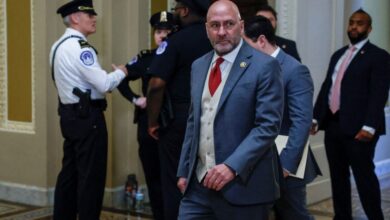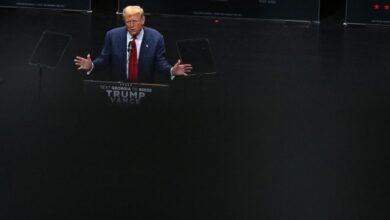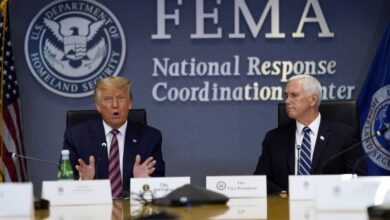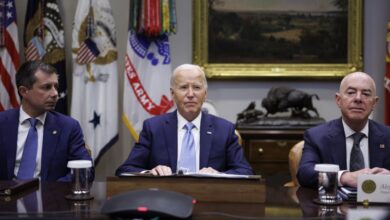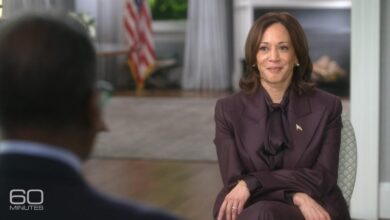Trump clarifies that his ‘enemy within’ comment was about evil Democrats
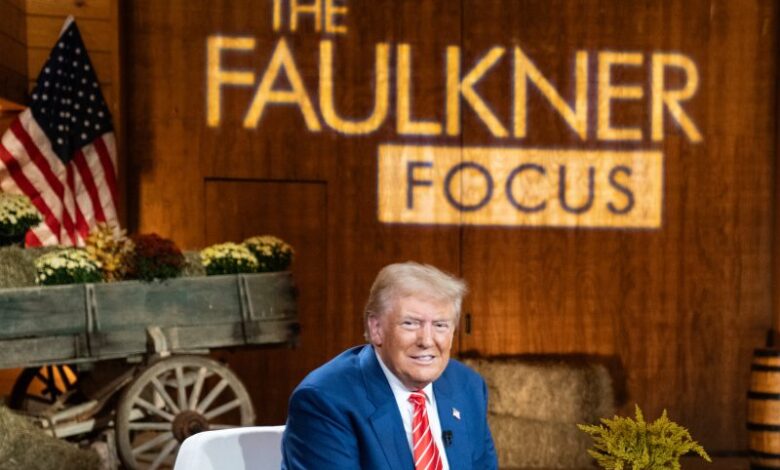
One of the most illuminating moments of Donald Trump’s increasingly lengthy career in national politics came during his third debate with Hillary Clinton back in 2016. (This was back when presidential campaigns had three debates coordinated by the Commission on Presidential Debates, itself a reminder of how the Trump era has diverted the political process.)
Clinton raised Russian President Vladimir Putin’s then-already-obvious interest in affecting the outcome of the race, prompting Trump to comment that Putin “has no respect” for Clinton.
“Well,” Clinton replied, “that’s because he would rather have a puppet as president of the United States.”
“No puppet,” Trump replied, clearly flustered. “You’re the puppet.”
When faced with criticism — particularly when that criticism is potent or well-aimed — Trump’s instinct is to try to turn it back on his critic. There are any number of examples littering the past nine years of political discourse, though few are as obvious and succinct as “you’re the puppet,” a very weird and very obvious effort. But things such as Trump’s recent insistence that Vice President Kamala Harris needs to complete a mental fitness evaluation certainly qualify.
So does his effort to redirect the criticism that his reelection poses a unique threat to American democracy — an argument that has an obvious through-line back to that “no puppet” moment. Critics, including from within his own party, have highlighted his effort to subvert the 2020 results and his plans to overhaul the federal bureaucracy to align with his political ideology. In response, Trump insists that it is Democrats who are trying to undermine the country, in part because of censorship — the evidence for which is generally centered on the government’s effort to limit the spread on social media of misinformation about coronavirus vaccines.
(This has been so inflated with gusts of hot air and is treated so seriously within the right’s conversational bubble that Trump’s running mate, Sen. JD Vance (R-Ohio), believed it to be a viable response to Minnesota Gov. Tim Walz’s question about the legitimacy of the 2020 election during the vice-presidential debate. It was not.)
After Trump told Fox News host Maria Bartiromo in an interview that aired Sunday that he believes that the “enemy from within” is as potent a threat to the nation as foreign enemies such as China and Russia — and when he further suggested that this internal enemy poses a risk to the election that should be combated with an armed response — some of those critics began more openly describing Trump as a fascist. (This was in part because retired Gen. Mark A. Milley, who served as chairman of the Joint Chiefs of Staff during Trump’s presidency, used the term when speaking to The Washington Post’s Bob Woodward.) And so, in another interview that aired Wednesday, again on Fox News, Trump insisted that the term applies instead to his opponents.
No fascist. You’re the fascist.
Host Harris Faulkner played the snippet of Trump’s Bartiromo interview in which he explained that the “enemy from within” included “lunatics” such as Rep. Adam Schiff (D-Calif.), one of the loudest voices during Trump’s first impeachment. Faulkner noted that Harris had suggested Trump is “unhinged.” (The crowd, heavily constituted of Republicans and Trump supporters, tittered at the very idea.)
Trump, predictably, denied that he is, calling Democrats “the party of sound bites.”
“Somebody asked me, ‘Can they be brought together?’” he said, apparently meaning that he was asked whether Democrats could work with Republicans. He suggested that he said he doesn’t think they could “because they are — they’re very different. And it is the enemy from within and they’re very dangerous. They are Marxists and communists and fascists.”
He returned to his criticism of Schiff, suggesting that Schiff is among those who “made up the Russia hoax” — that is, the investigation into whether Trump’s 2016 campaign had knowingly worked with the Russian effort to swing the results to his advantage. (A lengthy probe into the matter identified several members of Trump’s campaign who had been in contact with Russian agents and determined that the campaign had at least welcomed the Russian effort.)
And again Trump shrugged at the threat posed by foreign countries (including Russia) as easy to handle — more so than the threat from his political opponents.
“The more difficult are, you know, the Pelosis,” he said, referring to former speaker of the House Nancy Pelosi (D-Calif.) and, apparently, her husband, Paul.
Shortly before the 2022 election, a deranged man broke into the Pelosis’ San Francisco house in an apparent effort to force Nancy Pelosi to admit that the Russia probe was contrived. Paul Pelosi, who doesn’t work in politics, was struck with a hammer in the attack.
“These people, they’re so sick, and they’re so evil,” Trump continued. “If they would spend their time trying to make America great again, we would have — it would be so easy to make this country great.”
All of this, all of Trump’s response to the criticism of his initial comments Sunday, serves to bolster that criticism. Saying that Democrats are evil and sick and incapable of working with Republicans is commentary aimed at suggesting that no political agreement can be practically or morally achieved. Comparing the opposition of Democrats to that of foreign adversaries — casting it as worse than that of those adversaries, in fact — elevates the idea that internal enemies should be dealt with in the way we might deal with an invasion force from a foreign power.
“I think the bigger problem are the people from within,” he’d told Bartiromo after she’d asked about unrest on Election Day. “We have some very bad people. We have some sick people, radical-left lunatics. And I think they’re the — and it should be very easily handled by — if necessary, by National Guard or, if really necessary, by the military, because they can’t let that happen.”
Trump had an answer ready for critiques of his comments: No threatening. You’re the ones who are threatening.
“They were saying I was, like, threatening,” Trump continued. “I’m not threatening anybody. They’re the ones doing the threatening. They do phony investigations” — again a reference in part to the Russia probe but also to the criminal investigations he has faced. Two of them, of course, center on his obvious effort to subvert the results of the democratic election in 2020.
“It’s called weaponization of government. It’s a terrible thing,” Trump concluded. “They’re the threat to democracy.”
In much the same way that Hillary Clinton was Vladimir Putin’s puppet.
